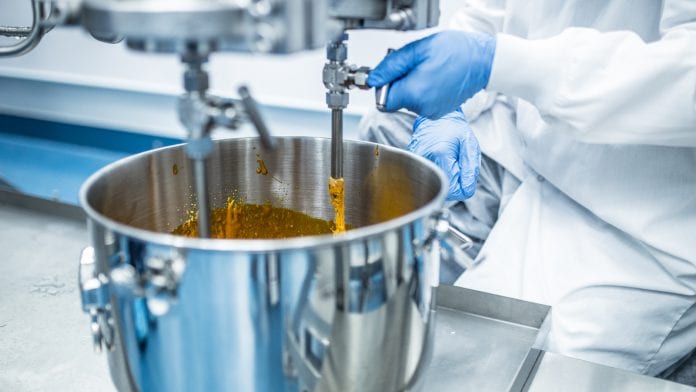
A group of deeply passionate cannabis professionals at The Valens Company, driven by a belief that there are more inclusive and safer delivery methods of consuming cannabis beyond smoking, came together to form Valens in 2014.
The Valens Company understood the endless possibilities for both patients and consumers to experience the many benefits of cannabis and began focusing on the high-quality work that Valens is known for today all over the world.
In just five years since its founding, The Valens Company has evolved into Canada’s largest third-party provider of cannabis services specialising in various types of cannabis extraction, purification, formulation, product development and analytical testing. Over the past few years, the company has been busy forging relationships with global leaders across a number of industries and securing intellectual property around its processes, equipment and end product solutions.
Looking ahead to 2020, The Valens Company is quickly expanding its globally recognised operations beyond Canada and into emerging markets such as the European Union, Mexico and Australia. All around the world, there is a rising demand for specifically dosed processed products like vape pens, beverages and edibles for their discreet use and predictable effects. As a result, the extraction industry is poised for incredible growth in the coming years.
The future of cannabis in the 21st century is tied to extraction, and in this article, Valens allows us to take a close look at the incredibly detailed process, its benefits and its ability to innovate a plethora of ways to consume cannabis, from smoking and vaping to ingestion.
Understanding cannabis and extraction
There are more than 400 different chemical compounds found in the cannabis plant and thousands of cultivars of cannabis being grown around the world today. Many of them have the potential to facilitate a number of positive outcomes in our minds and bodies. While we are becoming scientifically more familiar with common compounds such as cannabidiol (CBD) or tetrahydrocannabinol (THC) today, we are the early stages of understanding the full benefits of the cannabis plant and its ability to alleviate many different symptoms.
As The Valens Company study the plant further, we are discovering many more potential benefits and learning new ways to concentrate and formulate the compounds to optimise their positive effects. This brings us to extraction, a process through which the various compounds are extracted from the cannabis or hemp plant into a thick crude oil.
This crude oil can then can be further refined and concentrated to various levels of purity through a sequence of processes including winterisation (producing a ‘winterised’ oil which is 70-80% pure), distillation (producing a ‘distillate’ oil which is 80-95% pure) and isolation (producing an ‘isolate’ powder which is more than 99% pure).
Done correctly, this process retains the plant’s naturally occurring compound ratios and allows for the creation of customised formulations, while also removing any impurities that can negatively affect a user’s experience.
Once the oil with the desired level of purity is achieved, it can be formulated and packaged into various methods of consumption, including capsules, tinctures, topicals, vape pens, edibles, beverages and more.
How does extraction work?
Extraction uses temperature, pressure, solvents and time, all in a strategically controlled manner, to access one or many of the desired compounds found in the cannabis or hemp plant such as cannabinoids, terpenes, and flavonoids.
The process of targeting a single compound such as a major cannabinoid is much more efficient than targeting multiple compounds. This is because the extractor only has to focus on one combination of parameters (temperature, pressure, solvent and time) tailored to the chemical characteristics of that one compound.
When dealing with multiple compounds, if not done carefully, an extractor risks destroying the more volatile ones in the process. For example, terpene compounds, which are much more volatile than cannabinoids, must be dealt with in a more sensitive manner. To understand this further, let’s take a closer look at the various extraction methods.
Extraction 101
There is no single best formulation or method of using cannabis as the targeted benefits are as diverse as the bodies they interact with. With the ability to isolate desired compounds, formulate and then ‘package’ them into numerous products, the natural next step for cannabis lies in the versatility of oil. With this in mind, there are many forms of extraction, each with different benefits and limitations.
There are five main types of extraction, each with different benefits.
Solvent-based extraction
Different solvents bind to cannabinoids, terpenes and flavonoids in different ways and with various levels of efficiency. As such, it is important to have the desired end product in mind before selecting the appropriate type of extraction.
CO2 is very effective, particularly when it comes to creating full-spectrum oils for capsules, tinctures, vape pens, etc. It’s commonly used as a commercial solvent for things like coffee, tea and vanilla. It’s safe, affordable, recyclable and environmentally friendly.
Ethyl alcohol (ethanol) is most commonly used to satisfy high throughput requirements such as extracting CBD from hemp. It can be worked with in bulk, and it’s cost-efficient and highly scalable.
Hydrocarbon extraction (butane, pentane, propane) is a delicate form of extraction that is very effective in producing aromatic, terpene rich concentrates consumed in the form of high quality resin vape pens and shatters that consumers have come to love in mature markets such as California. Hydrocarbon extraction is able to bring out the broadest array of compounds found in the plant, resulting in experiences that are similar to smoking flower.
Although products produced by hydrocarbon extraction are experiencing significant growth, hydrocarbon-based solvents are quite volatile and require special care when being used to ensure the safety of operators and the facility.
Solventless extraction
Solventless extraction is a simple but less efficient process that has been used for generations. There are a lot of craft cannabis makers out there who prefer this method and its sister method – rosin pressing – which is one of the cleanest methods of extraction available. Solventless extraction uses only clean, filtered water, ice and dry ice (in the case of rosin) to extract the target compounds, and then heat and pressure to create a clean, full spectrum oil.
Chromatography is mechanical separation process used to target specific molecules. As we get closer to understanding what cannabinoids, terpenes and flavonoids are responsible for certain effects, being able to isolate specific molecules and remove all others will be imperative step in delivering targeted outcomes through future of cannabis product offerings. Chromatography effectively separates molecules from each other and removes impurities such as pesticides in order to deliver 99%+ purity levels of desired compounds, effectively creating an isolate.
The art of diverse, high-quality oil
We now know through studies and anecdotal evidence that different strains can provide different experiences such as feeling happy, alert, creative or relaxed. This is because each strain carries a unique profile of compounds working together, sometimes called the entourage effect, which is presumed to be responsible for creating that unique user experience. Because of this, full spectrum oil-based products are a popular choice for consumers seeking specific outcomes. However, the ability to create a true, full spectrum oil that mirrors the characteristics of the original plant can be difficult, especially when it needs to be done on a consistent basis at scale.
The process of extraction is complex and creating a high quality, purified oil rich in the targeted compounds is not easy. If the right steps are not performed by an experienced post-processing technician, there are risks to degrading the quality and yield of the oil and effectively losing that desired consumer experience all together.
Is extraction safe?
The process of extraction occurs in licensed facilities compliant with Canadian law and is very safe. Extraction uses a range of temperatures and pressures, and often includes flammable solvents, which is why the process and the equipment must be in strict adherence to high safety requirements and standard operating procedures.
Furthermore, extracted products allow consumers to use cannabis safely as well. In the case of vaping, cannabis is consumed at a lower temperature and many of the impurities found in flower are removed, significantly minimising consumers’ exposure to carcinogens and other toxins. With capsules, tinctures or edibles, the need to inhale through the lungs is completely eliminated.
Are extracted products tested?
Given that extraction results in a more concentrated product, it can be detrimental if the cannabis plant contains toxins or heavy metals that are easily drawn up from the soil during cultivation. This is similar to the potential of consuming mercury found in fish oils through concentrated omega capsules. Much like quality fish is needed to produce quality fish oil, quality cannabis is essential to quality extracts. This is why extraction must be backed by rigorous scientific testing and quality control right from the start.
Unfortunately, given that the cannabis industry is still in its early stages of growth, there are many issues with testing in regulated markets. For one, it can be a massive bottleneck in the supply chain as a limited number of qualified labs exist and need time to work through the significant volume of samples submitted. Secondly, cannabis testing methods are not yet standardised, and this can result in alarmingly inaccurate results.
Therefore, it is incumbent upon companies to engage respectable labs with proven methodologies in order to effectively achieve consistent product quality. Valens Lab, for example, is working with various global organisations such as Thermo Fisher Scientific to publish its methodologies in an effort to achieve standardization and improve the quality of cannabis testing worldwide.
The future of oil-based cannabis products
Good flower remains an important offering for cannabis enthusiasts who prefer to smoke, but US sales data shows consumers increasingly favouring oil-based offerings with significant growth in these categories year over year since 2016. Oil-based products have strong appeal with those who desire a healthier, simpler and more discrete way to consume. They also allow people to dose more accurately.
All these benefits appeal to a broader demographic of patients and recreational consumers in the rapidly expanding market of cannabis enthusiasts. In addition, the new look and feel of these products goes a long way in diminishing the lingering social stigma of cannabis.
Finally, with oil-based products, users can go one step further and achieve specific experiences they desire. This is possible due to formulation, the next step after extraction.
Valens’ emulsion technology and the future of ingested products
One of the biggest areas of growth for extracted products is ingestible products (edibles and beverages.) But there are several challenges brought about by these products which must pass through the human stomach once consumed. More specifically, compounds like THC are absorbed into the bloodstream and shuttled directly to the liver where they are processed and filtered before entering the blood stream and circulating throughout the body.
With this initial processing and filtering in the liver, the amount of cannabinoids is reduced and the remaining cannabinoids don’t reach the brain for a lengthy period of time (which varies from person to person). This makes it difficult to predict an onset, which can take as long as a few hours to set in. The effects also last longer than smoking or vaping, and in rare cases can be felt days after the initial consumption. With edibles, it is very common to over consume and have a negative experience which often discourages a user from consuming again.
To prevent these inconsistencies and provide consumers with a more predictable experience, The Valens Company has invested in an innovative, patent pending emulsion technology called SōRSE. This technology encapsulates cannabinoid rich oil droplets in a manner which masks them from the sensory receptors in the body which would normally trigger the transport of the cannabinoids to the liver.
As a result, the cannabinoids are now able to be absorbed within the digestive tract (rather than the liver) which is a much more efficient delivery channel into the blood stream. In addition, because the cannabinoids are no longer subject to filtration in the liver, a lower dosing is often required to achieve the same result. Many causes of negative experiences with cannabis (over consumption, for example) diminish substantially with a successful emulsion technology.
How does this technology work in beverages and edibles?
Having a homogenous solution that is consistent, from the first sip to the last (or the first bite to the last in the case of edibles) is essential for a safe and positive consumer experience. Unfortunately, oil and water are naturally incompatible and if left on their own, they will inevitably separate over time.
When an emulsion is successful, the solution or mixture will remain homogenous and the dissolved particles will remain equally dispersed for a significant period of time. Cannabinoids are particularly challenging to integrate into consumables, especially into beverages, as by nature they are insoluble, bitter and unpleasant to taste.
The Valens solution
The SōRSE emulsification technology, which encapsulates the cannabinoid rich oil, offers a number of benefits for beverage and edible products in addition to providing solution consistency and stability. Firstly, it eliminates the unpleasant odour and bitter taste of cannabis which is a key barrier to competing with the wide variety of taste profiles available in other drink and edible formats on the market.
Secondly, it produces a fast and predictable onset and offset which allows for greater social integration and a more controllable user experience. Thirdly, its particle size is small enough to increase the bioavailability of the cannabinoids but does not break the blood brain barrier which has been cause for some concern in other nanotechnology formats. Finally, it limits the interactions between active ingredients which allows for full-spectrum, isolated cannabinoid, and terpene-based oil infusions.
Technologies such as SōRSE are expected to be an important catalyst in the mass adoption of cannabis infused products around the world because of its ability to transform an often unpleasant and unpredictable outcome into a safe, predictable and customisable user experience.
Valens today
The group of deeply passionate cannabis professionals who came together in 2014 to form Valens continue tirelessly to drive the company and overall industry toward a bright and exciting future, with the core goal of providing safe, innovative, consistent experiences through various delivery methods for patients and consumers.
The company has invested significant time and money into its wholly owned subsidiary Valens Labs, the first lab in Canada to become ISO 17025 accredited for the cannabis matrix which is viewed by many as one of the highest standards of testing in the world.
It continues to leverage its proprietary technologies and intellectual property around extraction, processing and formulation to adapt to trends and target specific customer experiences that elevate the impact of their products. With customers ranging from Canopy Growth, the largest cannabis company in the world, to national Canadian pharmaceutical companies like Shoppers Drug Mart, Valens is pushing the cannabis industry towards meaningful innovation and greater patient and consumer satisfaction.
As the one stop shop for cannabis and hemp-based companies looking to create well-branded products in a rapidly growing and changing cannabis consumer environment, Valens stands in a league of its own.
Jeffrey Fallows
President
The Valens Company
+1 778 755 0052
jeff@thevalenscompany.com
Tweet @TheValensCo
thevalenscompany.com
This article will appear in the first issue of Medical Cannabis Network which will be out in January. Click here to subscribe.









